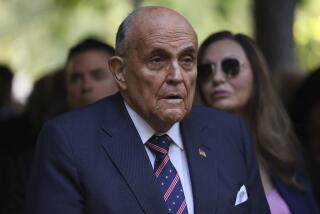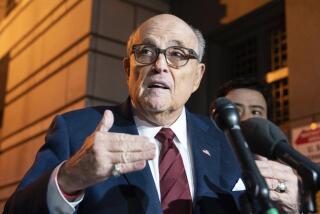Are the Republicans Ready for Rudy?
MEMPHIS — When Rudolph W. Giuliani stepped on stage in an enormous sports arena here, he was greeted with a brassy rendition of “New York, New York,” a blinding cloud of confetti and a roaring ovation from a crowd of more than 10,000.
The response at the recent business seminar was a tribute to the widespread appeal of the former mayor, who cleaned up New York and stood strong in the wake of the Sept. 11 terrorist attacks. But it also looked like a dress rehearsal for a presidential campaign.
With polls showing Giuliani an early front-runner among the GOP’s potential presidential candidates in 2008, this appearance and others around the country raise a question: Is the Republican Party ready for a nominee who takes liberal positions on abortion, gun control and gay rights; has had two messy divorces; once lived with a gay couple; and endorsed liberal icon Mario M. Cuomo to be governor of New York?
Maybe so, if the warm reception he got from the mostly conservative audience in Memphis is any indication.
“I think that man would make an excellent president,” said Tamara Lowe, the mistress of ceremonies at the event.
But many Republicans see Giuliani as a walking political paradox. Although he is one of the party’s most popular, best-known leaders, they cannot imagine him winning the nomination for a party in which evangelical conservatives have a big voice in presidential politics.
David A. Keene, chairman of the American Conservative Union, said, “Giuliani is a smart enough guy to know that the first day of his campaign would be his best day. He is superficially popular, but when
Giuliani has said he will not make a decision about seeking the presidency until after November’s midterm elections. But his calendar is loaded with political appearances that would serve him well if he runs.
Today, he attends a New York fundraiser for California Gov. Arnold Schwarzenegger. Monday, he travels to Iowa, site of the presidential season’s first nominating contest, to appear with local GOP candidates and raise money for the state party. Tuesday, he headlines a fundraiser in Washington for the National Republican Senatorial Committee.
Such stops help Giuliani bank goodwill from other Republicans that he could draw on in a presidential race. But unless he backs away from his support for gay rights, gun control and abortion rights, a Giuliani campaign would hinge on a crucial question: In the post-Sept. 11 political world, are such social issues less important than they have been in GOP presidential politics?
“If the country is focused on international terrorism, those issues will recede,” said Rep. Peter T. King (R-N.Y.), a longtime friend who disagrees with Giuliani on abortion rights but admires his political skills.
If Giuliani runs, his tenure as New York mayor from 1994 through 2001 -- not just the part that came after Sept. 11 -- would get new attention from supporters and detractors.
“He would run on his record,” said Anthony V. Carbonetti, a business partner and political advisor to Giuliani. “Here’s a guy who governed the largest city in America for eight years, brought down crime, brought welfare rolls down dramatically and reduced taxes. Are there better conservative principles than that?”
A less flattering view of his mayoralty is portrayed in “Giuliani Time,” a documentary that opens in New York on May 12. Directed by Kevin Keating, it seeks to undercut what the film’s website terms Giuiliani’s “secular sainthood” -- the view of him as a supermayor who turned New York from a crime-ridden, welfare-dependent city into a model of urban renaissance.
The film’s title comes from the notorious 1997 case of a Haitian immigrant who was beaten and sodomized by police with a broomstick. At the time, a police officer was reported to have said during the attack, “It’s Giuliani time”; that claim later turned out to be false.
Giuliani’s stormy private life also may come under renewed scrutiny. His divorce from his second wife, Donna Hanover, was especially bitter. And as their marriage fell apart, Giuliani moved out of the mayor’s mansion and stayed for a time with a gay couple in their Manhattan apartment.
But for many voters, such matters are likely to be eclipsed by the Giuliani they saw on Sept. 11. He put himself at risk when he quickly went to the World Trade Center before its twin towers collapsed. In the weeks that followed, he led New York’s recovery effort with a reassuring, no-nonsense confidence. He was named Time magazine’s “Man of the Year” in 2001. He became known as “America’s Mayor.”
Now, as Giuliani weighs whether that celebrity can be parlayed into a viable presidential bid, people close to him say he is genuinely undecided. But in the meantime, “he wants to be prepared if he decides to go forward,” said a confidant, who requested anonymity when discussing private conversations with Giuliani.
There’s little escaping public interest in his plans. When Giuliani spoke recently at a nonpolitical meeting of corporate lawyers in McLean, Va., the first question from the audience was, “Are you going to run?”
“In the New York marathon?” he bantered. “One thing I learned, going through 9/11 and prostate cancer: You don’t predict the future until you get there.”
If he returns to the political fray, Giuliani would leave behind the comfort of a well-paid private life. He is a partner in a law firm, heads a big consulting firm and receives large fees for the dozens of speeches he gives a year -- reportedly as much as $100,000.
As he tests the waters, Giuliani has been trying to build bridges to party conservatives.
He recently campaigned for Sen. Rick Santorum (R-Pa.), a darling of the religious right, and soon will headline a fundraiser for Ralph Reed, the former executive director of the Christian Coalition of America, who is a candidate for lieutenant governor in Georgia.
In January, Giuliani gave a free speech to thousands of evangelicals at a meeting in Florida of the Global Pastors Network. “I can’t tell you ... how much I appreciate what you are doing,” said Giuliani, a Catholic, at the end of his speech on leadership.
Still, there may be a limit to Giuliani’s ability to win over the Christian right. For instance, evangelical leader Jerry Falwell said in a recent CNN interview that he could not support a Giuliani presidential candidacy.
“We have probably irreconcilable differences on life and family,” Falwell said.
Giuliani’s supporters acknowledge the political obstacles he would face as a presidential contender, but believe he could overcome them.
“There is no way on God’s green earth that many people with [Giuliani’s record] could get this party’s nomination,” said former Republican Rep. Susan Molinari of New York. “But I do think Rudy Giuliani can. He’s a historic figure who is able to shake that conventional wisdom and break that mold.”
If Giuliani is running, his pre-campaign strategy has been unconventional. He has raised little money. Unlike other potential candidates, he has not yet lined up consultants.
But he has found ways to gain exposure -- and potentially build support. The speech he gave in Memphis was one of many he has been paid to deliver for an organization that offers motivational seminars.
Along with his political appearances Monday in Iowa, he will speak at a “Get Motivated” seminar expected to attract 18,000. State officials are so concerned about a possible traffic jam that they are spending $50,000 to provide a temporary exit ramp to the gathering from an interstate highway.
His talk in Memphis was typical for the events. Introduced after a couple of patriotic anthems, Giuliani paced the confetti-strewn stage as he talked about what makes a good leader. He cited Ronald Reagan as his hero. He reminded the audience of his accomplishments as mayor, including the cleanup of vice-ridden Times Square. “You can see ‘Lion King’ instead of drug dealers,” he said.
But the speech’s emotional center was Sept. 11. When Giuliani described seeing people jump from the windows of the burning World Trade Center, the once-restive audience was rapt and silent. He warned that the U.S. should be ready for another attack. And he faced no pesky questions about abortion rights.
Some conservatives seemed ready to put aside their differences with him on social issues.
“Everyone’s seen the way he handled 9/11,” said Sheila Voyd, a Federal Express employee. “There’s more than one issue when you are looking at the political field.”
“I like the fact that he’s conservative, but he’s positive,” said Gary Fetters, a financial services advisor. “As we say in the South, he’s a ‘git-er-done’ kind of guy. He’s got the No. 1 spot in my mind.”
But Giuliani still has work to do to win over voters such as Walt Grimes, an automobile parts salesman, who was favorably impressed until he learned that the former mayor supported gay rights.
“That pretty much shot him in the foot,” Grimes said. “As a general rule, I’m a dyed-in-the-wool conservative, so I’m very wary.”
More to Read
Get the L.A. Times Politics newsletter
Deeply reported insights into legislation, politics and policy from Sacramento, Washington and beyond. In your inbox three times per week.
You may occasionally receive promotional content from the Los Angeles Times.











